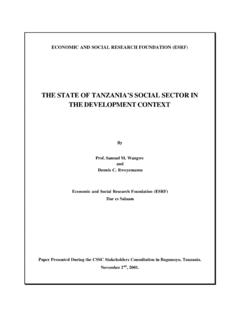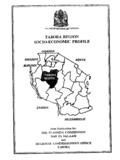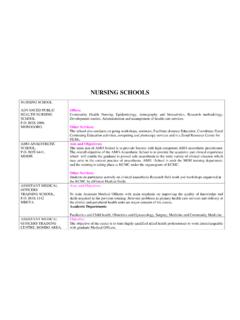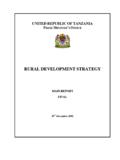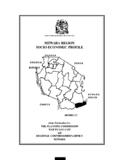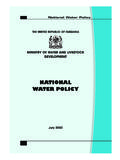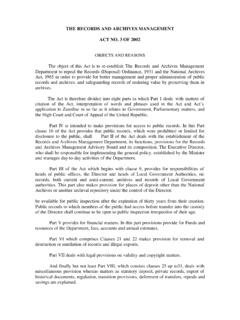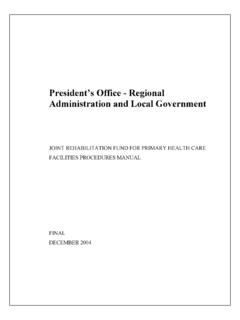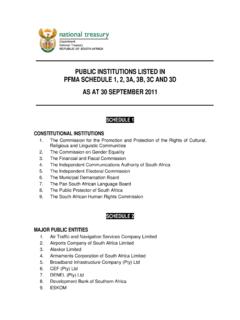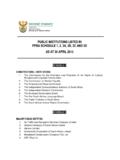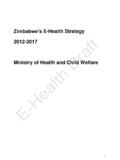Transcription of VOCATIONAL EDUCATION AND TRAINING BY …
1 VOCATIONAL EDUCATION AND TRAINING BY GOVERNMENT IN TANZANIA THE EXAMPLE OF COMMUNITY ORIENTED VOCATIONAL TRAINING IN FOLK DEVELOPMENT COLLEGES Prepared for VETA / GTZ Tanzania Monika Redecker, FAKT Germany Anne Wihstutz, GTZ Dar es Salaam Joyce Mwinuka, VETA Dar es Salaam FAKT- Bonn, Dar es Salaam May 2000 VOCATIONAL EDUCATION and TRAINING by Ministries in Tanzania, Examples of FDCs 1 Contents Page Abbreviations 3 Executive Summary 4 1. Introduction 6 Background 6 Terms of Reference and Methodology 7 2. VOCATIONAL EDUCATION and TRAINING in Tanzania 7 Policy Background 7 Provision of VOCATIONAL EDUCATION and TRAINING 9 The Role of VETA 10 3. TRAINING Provision under Government Ownership 13 VOCATIONAL EDUCATION and TRAINING under the Ministry of EDUCATION and Culture 13 The Technical Secondary Schools 13 The Post Primary Technical Centres 14 Programme 14 Resource and Curriculum 15 Administration and Monitoring 16 Financing 16 Co-operation and Co-ordination with other Ministries 17 Ministry of Labour and Youth Development 17 TRAINING provision under the Department of Social Welfare 17 TRAINING provision under other Departments 18 VOCATIONAL EDUCATION and TRAINING by Ministries in Tanzania, Examples of FDCs 2 3 3.
2 VOCATIONAL EDUCATION and TRAINING under Line Ministries 19 The Ministry of Works 19 The Ministry of Industry and Commerce 20 The Ministry of Agriculture 20 Other Line Ministries 20 4. The Folk Development Colleges 21 Historical Background and set up 21 Mandate and Orientation 21 Folk Development Colleges under the Ministry of Community Development, Women Affairs and Children (MCDWAC) 22 Outside Support 23 Instructors and Personnel 23 TRAINING Programmes 24 Management, Community Ownership and involvement 26 Facilities and Resource Mobilisation 27 Financing and Sustainability 27 The Role of the Ministry MCDWAC 28 5. Conclusions and Recommendations 29 TRAINING Institutions and activities under various Ministries 29 Folk Development Colleges 33 Annex VOCATIONAL EDUCATION and TRAINING by Ministries in Tanzania.
3 Examples of FDCs 3 Abbreviations CSSC Christian Social Services Commission CDTI Community Development TRAINING Institute DANIDA Danish International Development Agency FDC Folk Development College FTC Full Technician Certificate GTZ Gesellschaft f r technische Zusammenarbeit ILO International Labour Organisation MCDWAC Ministry of Community Development Women Affairs and Children MOEC Ministry of EDUCATION and Culture MNRT Ministry of Natural Resources and Tourism MVM Motor Vehicle Mechanic PPTC Post Primary Technical Centre Sida Swedish International Development Agency VET VOCATIONAL EDUCATION and TRAINING VETA VOCATIONAL and EDUCATION TRAINING Authority VT VOCATIONAL TRAINING VTC VOCATIONAL TRAINING Centres VOCATIONAL EDUCATION and TRAINING by Ministries in Tanzania, Examples of FDCs 4 Executive Summary Various actors are involved in VOCATIONAL EDUCATION and TRAINING (VET) in Tanzania.
4 Besides private TRAINING providers, companies, NGOs and churches, governmental institutions contribute to the sector. Estimations from 1995 set government activities up to 19% of the engagement in VOCATIONAL TRAINING and EDUCATION . Several Ministries provide TRAINING , in particular the Ministry of EDUCATION and Culture and the Ministry of Community Development, Women Affairs and Children. These have prominent capacities in pre-employment TRAINING . However, experiences in the past years show that TRAINING institutions face increasing constraints in the sector to adjust to new and changing programmatic requirements. Furthermore indications show that due to decrease of funding by government sources, ministerial TRAINING institutions are forced to look for new avenues and niches within the TRAINING sector, and hence the initial picture of TRAINING provision has to be adjusted to the new changes.
5 However, information is scattered and stays within the respective ministries and institutions. According to the VET Act from 1994 VETA has the responsibility to co-ordinate VET among the different players. It is against that background that VETA / GTZ assigned the study on ' VOCATIONAL EDUCATION and TRAINING by Government in Tanzania - The Example of community oriented VOCATIONAL TRAINING in Folk Development Colleges', which should in particular provide an overview of governmental actors in VOCATIONAL EDUCATION and TRAINING in Tanzania and to identify areas of Co-operation with VETA prepare case studies of the FDCs under the Ministry of Community Development, Women Affairs and Children (MCDWAC), focussing on selected aspects. The Results of the study show: Ministerial contributions to their respective VT TRAINING institutions have been decreasing in the past years and are limited to catering the expenses for staff and personnel.
6 Due to retrenchment, employment of new staff has been frozen. Employment figures have not changed since 1993 concerning quantity and quality. TRAINING capacity is by and large seriously under-utilised and ranges between zero to 40-50% in capacity utilisation, depending on the physical location and Ministry. This is due to lack of funds and the difficulty clients face to pay for TRAINING . Nearly all institutions that formerly trained ministerial staff, opt for a similar strategy in responding to the cut of governments funds. They diversify their TRAINING programmes by introducing short term TRAINING courses which address the general public in their respective field of expertise. The TRAINING programmes often do not show a clear indication to labour market needs and developments.
7 They are restricted to a marketable activity of the VOCATIONAL EDUCATION and TRAINING by Ministries in Tanzania, Examples of FDCs 5 respective institution. The TRAINING market becomes much more competitive and addresses those who are able to pay for TRAINING . While those who cannot afford, and do not have the entry qualification are disadvantaged both in rural and urban areas. Centre based and pre-employment TRAINING institutions such as under MOEC and MCDWAC stick to their programme activities and struggle in surviving, due to the weakness in programme, structure, equipment, competence and communication. Co-ordination among the actors in VET is weak on both levels, on national level among the Ministries and on regional level among the implementers. This contributes to yet more duplication and competition.
8 It aggravates the already weak position even more. VETA is the authority to co-ordinate VET in Tanzania. It also provides services and disseminates information pertinent for the TRAINING providers in their endeavour to adjust their TRAINING to labour market needs and requirements. The study recommends that VETA should take a much stronger role in co-ordinating the activities in basic VET provision among the various providers, both on national and regional level. This will require further development and an increase in support given to the existing regional offices and decentralised infrastructure. The already laid down tasks of the Regional VET Board should facilitate a process which links the focus on regional development with skills TRAINING need, respecting the existing regional TRAINING resources in and outside government.
9 In light of harmonising demand and provision of VET in Tanzania a concerted approach and dialogue will be needed among the different stakeholders, government and non-government. The organisation of a national workshop on demand and requirements of VET, policies, approaches and concepts, to map out the contributions of the various stakeholders could be a starting point and is highly recommended. Finally VETA is encouraged to take over the initiative and a facilitating role in organising such a forum. VOCATIONAL EDUCATION and TRAINING by Ministries in Tanzania, Examples of FDCs 6 1. Introduction Background VOCATIONAL TRAINING in Tanzania is offered by a variety of TRAINING providers. Estimations from 1995 indicate players ranging from Private TRAINING providers (companies small workshops etc.)
10 Mission and Trade schools Government TRAINING Institutions TRAINING institutions owned and run by VETA Data from 1995 reveal an enrolment capacity of approximately trainees all over the country. Not considered in these figures are Specific TRAINING institutions which offer TRAINING for special target groups. TRAINING institutions which orient specifically for line ministry responsibilities. An initial stocktaking of government and private involvement in VET has not been done, thus resources and capacities as well as experiences with different approaches are not widely spread. A prominent provider of centre based VOCATIONAL TRAINING is the Ministry of Community Development, Women Affairs and Children (MCDWAC). It runs approximately 52 Folk Development Colleges (FDCs) all over the country.
